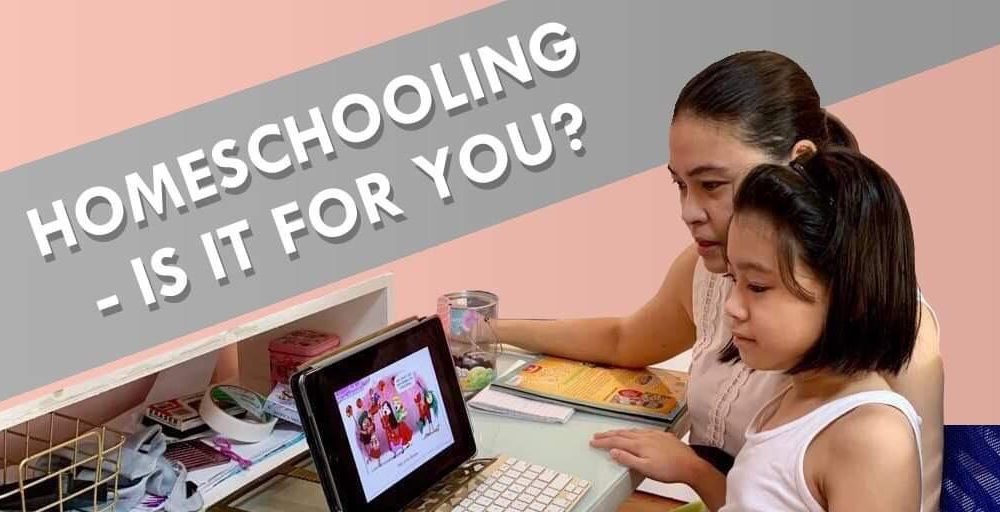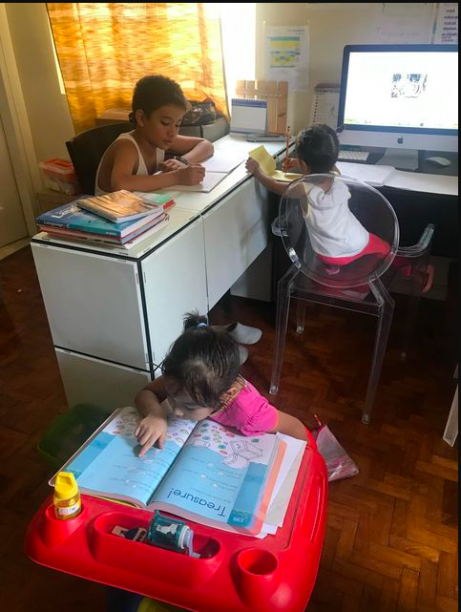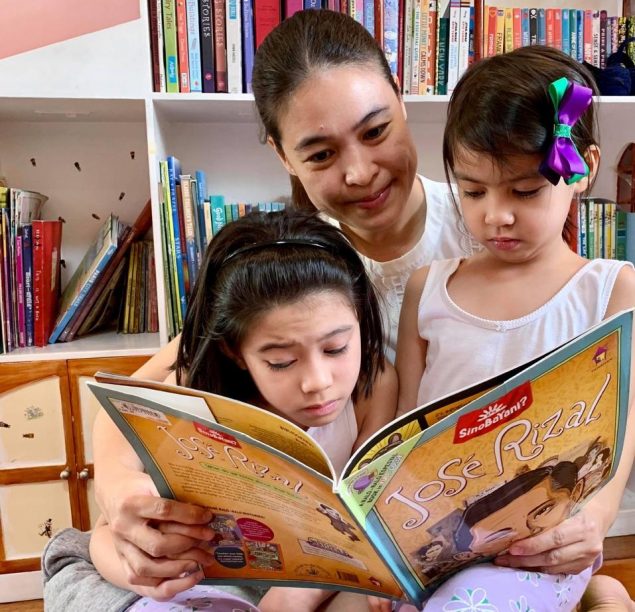Home > Blog > Covid-19
Homeschooling – Is it for you?

Last week, online classes formally started in public schools. Despite the continued operations of the country’s academic sector, the Department of Education (DepED) reported that enrollment in all levels for the school year 2020-2021 dropped to over 25 percent from the previous year.
But parents working from home have found another option for their kids this school year—homeschooling, which Ella Martelino, mother of two, decided to try. “We have two children aged 8 and 6, and no house help. My husband has his own law practice and I have my own little company to manage on top of our household. Even during vacations, our days could get crazy. I’m not sure how we could handle hours of daily online classes for now.”
But for Ces Nitafan, also known on social media as Homeschool Momma PH, it’s business as usual since she’s been homeschooling her kids for a decade. “Before, people thought homeschool was only for the rich—children of diplomats, foreigners or celebrities. Or that it was for parents against traditional schools, or for child athletes or children with special needs.” But Ces believes that because of social media, parents have realized that homeschooling is not a status symbol, but a real option for their kids’ education. “Before, the Homeschoolers of the Philippines Facebook group only had 200 members. Now, we’re about 35,000!”
 Ces’s three homeschooled kids
Ces’s three homeschooled kids
Journey to Homeschooling
The idea to homeschool her kids was cemented when she and her husband attended a Kids’ expo that featured a homeschool provider. When Ces saw how well the homeschooled kids were performing, she decided to take the plunge. “But here’s the clincher. To homeschool our child, someone had to stay home. At that time, my husband and I were both working, and I practically lived out of a suitcase. In fact, we were so busy that our child, who was 3 years old then, lived with my parents, and we only saw him on weekdays. “
The couple thought hard if their family could survive on a single salary. In the end, they decided to let go of their condo unit and let Ces resign. Her husband worked harder than ever while Ces stayed home to care for their son. “It turned out to be for the best,” she shares. “We couldn’t have a second child because my work was too stressful. When I quit my job, I had two more kids.”
Challenges of Homeschooling
Though homeschool seems ideal, Ces warns that it’s not a bed of roses. “When we started out, it was a constant warzone. My child had already attended school so when I began teaching him, he would go, ‘No, teacher is like this. Teacher is like that.’ And I’d reply, ‘No, I’m your teacher now!’”
Ces, like most mothers of her generation, grew up in a traditional school where students were taught to studiously copy notes and memorize. But since homeschool is closest to the progressive style of education, which is child-led, she had to unlearn a few things. “A decade ago, there weren’t a lot of homeschooling material on social media, so I had to read books on it. I even took up education units.” But Ces clarifies that homeschooling parents don’t have to go this far. “I strongly suggest talking to old-time homeschoolers because no book prepared me for this. Still, you have to understand that each family has its own dynamics. What worked for a successful homeschooling parent might not work for you. So just apply what you can, and as for the rest, be open-minded. There will be challenges, and you have to be flexible. It’s more on being intuitive.”
 Ces dividing her time between her two younger kids
Ces dividing her time between her two younger kids
Benefits of Being Your Child’s Teacher
Pre-pandemic, Ces enjoyed taking family vacations during the off-peak season. “We can even go to museums on weekdays when there are no crowds.”
By teaching her kids, Ces says she gets to know them on a much deeper level. “Homeschooling’s real gift to us is that we get to mold and witness the unfolding of each of our children’s unique character. When I see them interacting with other kids, I take pride that their self-esteem is well-placed, and that they’re not afraid to speak out. We them grow before our very own eyes.”
As to the financial cost of homeschooling, Ces debunks the idea that it’s pricey. “It depends on your diskarte. For the first two years, I had a homeschool provider that gave us everything we needed—books, a curriculum. We just had to submit grades, and that helped us a lot.” But when his son got bored with the books, Ces did her research and found another US-based provider that allowed them to customize the curriculum at one-fifth of the price. “We mixed and matched, and we paid about P25,000 for a school year. If you have a support group, you can share books so you don’t have to buy new ones. At that time, the bulk of our expenses went into enrichment classes—ballet, music, swimming.” But with today’s wealth of online resources, Ces says parents will have no problem honing their kids’ skills. “I know homeschoolers that save a lot of money because everything can be found online for free—even art and dance classes. There are even public-domain books you can download. You can be as frugal—and spend five to ten thousand pesos as year—or expensive as you like.”
Ces admits that homeschool books are costly because they’re shipped from the US. “But they’re expensive for a reason. They’re written in a way that you can use them from kinder to college. So your kids with different grade levels can use the same books.” But even this necessary cost can be whittled down. Aside from borrowing books, Ces saves on online subscriptions by splitting monthly fees and sharing usernames and passwords with other parents. “I want parents to know that you don’t have to spend a lot on homeschool. Whatever your economic status is, it’s doable.”
With homeschooling, Ella finds more freedom in educating her kids. “We get to decide on our kids’ learning pace. We could breeze through topics they’re interested in and spend more time in those they find challenging.”
Birth of Homeschool Momma PH
Ces used to have a blog, which she eventually migrated to Facebook. “It was established mainly to document our homeschooling for our provider. From a personal blog, the page evolved into a platform to encourage other homeschooling parents.”
When the pandemic hit, Ces saw her page likes balloon from 300 to 3,000. “. Some companies have approached me and I always tell them that instead of giving me something, they should give to the homeschool community. My vision for Homeschool Momma PH is for its group members to have benefits such as discounts or special access to education-related things.”
Because of the growing number of homeschoolers, Ces began the private group, the Better Together Support Group. “This was made for the new and accidental homeschoolers because of COVID-19. We do videoconferences to coach and mentor, and share resources.”
 Ella reading to her daughters
Ella reading to her daughters
Homeschooling Tips for Newbies
Perhaps the greatest fear homeschooling parents have is that they’re incapable of teaching their children. Ella echoes this sentiment: “I’m still not sure if we’re doing things right, and if homeschool will work out for us in the long run.” However, Ces puts this fear to rest. “Really, you’ve been homeschooling your children ever since they were inside your tummy. You taught them to walk. We just delegated their education because we thought we couldn’t do it.” She gives these other tips:
Create a schedule— but be flexible.
Ces has an 8th grader, a 1st grader and a three year old. To manage a multi-level homeschool, she tries to allot 1 to 2 hours for each child. Her eldest, who prefers to study on his own, requires the least one-on-one time from her. “I’m more lenient with the younger ones, but I’m strict with my eldest to teach him time management skills.” To maximize time and effort, Ces gathers all her kids for character lessons. When it’s time for PE (Physical Education), she lets them choose the activity. “Sometimes they just go to the playground, and my eldest watches over the little ones, which, in itself, is a life skill. Now that our village has opened its swimming pool for one family at a time, we book it in advance so we can use it.”
Be relaxed, not lax.
“We advocate child-led learning. Some people are concerned about this, but we’ve seen kids who went through child-led learning and grew up to be productive and successful adults.” Ces also employs age-appropriate discipline. “When they’re younger, you allow them to explore and be relaxed. But when they’re moving on to middle school, to high school, then you introduce structure because you’re preparing them for college life.” For Ces, learning comes in many ways. “Try to make it fun for them. It doesn’t have to be pen and paper or books all the time. You can watch movies and then use that as your lesson for the day.”
Know your child’s learning style.
Is your child visual? Auditory? Kinesthetic?. “You can search this on the internet, and take the test to know your child’s learning style. Then you’ll know the best way to teach them—not based on how you were taught. Sometimes you catch yourself saying, ‘When I was your age, I already knew the multiplication table!’ It’s not like that. You have to adjust to your child.”
Make time for yourself.
Because teaching your children is no easy task, Ces stresses the importance of “me time.” “That’s a downside of homeschooling—you have less time for yourself. But my kids know that when 4 P.M. hits, I can’t be bothered. For an hour, at least, I have time to rest and relax.” Doing her morning prayers also equips Ces with the strength to get through the day. “I’ve tested and proven this all these years—when I wake up energetic, my kids are also lively and easier to teach. When I’m downcast, they feel the same. So it’s important to recharge.”
Unplug.
Though Ces runs a Facebook page, she doesn’t spend too much time on social media. “Because if you’re so immersed in social media—researching, joining groups, asking, reading all those posts—you’ll compare yourself and your kids with others. You will question and doubt yourself. It’s best to filter your resources.”
Don’t be too hard on yourself.
“Be forgiving,” advises Ces. “When schedules fail, when your plans fall through, go easy on yourself. If today, you didn’t solve that math problem, tomorrow, you can all be better. Allow for life to happen. Nurturing your relationship with your family is the most important.”
For more resources on homeschooling, check out Homeschool Momma PH on Facebook.

